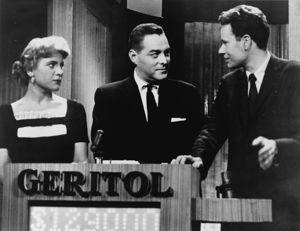Quiz show
A quiz show is a broadcast program on television in which people answer questions for prizes. Contestants can be members of the public as well as celebrities, and can compete as teams or individually. The game's rules are usually simple and understood beforehand, almost always with time limits. The entire show is built to create interest and excitement, and usually features gimmicks such as flashing lights, ringing bells, humor and costumes, with a fast pace. The host of the show is usually a celebrity or, if the show is highly rated, becomes a celebrity quickly, and there are numerous opportunities for the show's sponsor to tout their wares, sometimes by offering them as prizes, or using them in questions, and so forth. One popular quiz show in the US called "Jeopardy!" features three contestants competing against each other to answer trivia questions, and they must pose their answers in the form of a question such as "What is the...".
History
Many television game shows were ported from similarly-themed shows on radio. A hit quiz or game show can be highly lucrative for a network, since the shows can be shot indoors on an easy-to-control budget; some successful TV game shows have been running for decades with little variation in their format. Quiz shows have been marked from time to time by rather well-publicized scandals; producers of the TV show Quiz Show, for example, were found to have been feeding the correct answers to one of the contestants who was thought to have drawn higher ratings; but when the truth was exposed, a huge uproar resulted, including testimony by the show's executives before members of Congress.[1]
The genre has evolved, with bursts of creativity from many sources. According to one account, the earliest quiz shows grew out of "on-the-street" radio interviews on a show called Vox Pop, a Houston-based radio program in 1932.[2] Money was added to the mix; a CBS radio program in 1936 called Professor Quiz featured interviews with guests tried to stump Dr. Craig Earl with questions; "those who were able to stump him walked away with a cool $25."[2] Generally quiz show questions were easy, although additions of the Information, Please almanac in 1938 added new dimensions to the possibilities for questions.[2] Later, Groucho Marx in the TV quiz show You Bet Your Life tweaked the formula again by adding a celebrity host, humor, and this show lasted 14 years and ended in 1961.[2]
Why are quiz shows successful? A reporter for National Public Radio mused:
| ‘ | Some of these shows have had a more obvious impact on the scores of other quiz shows that have followed, but each was founded on an unshakable premise. People liked hearing -- and later seeing -- others who looked like them put to a challenge. The formats, which over the years would range from extremely gimmicky (Hollywood Squares, anyone?) to, well, a little less gimmicky (Jeopardy!'s answer-in-the-form-of-a-question rule), didn't matter nearly as much as the opportunity the shows gave normal people to be stars for just a moment.[2] | ’ |
References
- ↑ Richard Zoglin. TELEVISION: Why Quiz Show Is a Scandal, Time magazine, Oct. 10, 1994. Retrieved on 2010-03-02. “"We're not exactly hardened criminals here," says the TV producer testifying before Congress at the end of Quiz Show. "We're in show business." By this point in Robert Redford's critically acclaimed new movie, no one can miss the irony of that line. The people who conspired to rig the big-money quiz shows in the 1950s, according to the film, were criminals all right -- and not despite but because of the fact that they were in show business. These connivers didn't just feed a few answers to favored contestants to boost ratings.”
- ↑ 2.0 2.1 2.2 2.3 2.4 The Quiz Show, NPR, une 24, 2002. Retrieved on 2010-03-02. “The earliest quiz shows, according to John Dunning, the author of On the Air: The Encyclopedia of Old Time Radio, grew out of the person-on-the street interviews of Vox Pop, a radio program that began broadcasting from KTRH in Houston in 1932. On Vox Pop, contestants would be approached by host Parks Johnson and asked random questions. They would win a token of a prize for a correct answer.”
